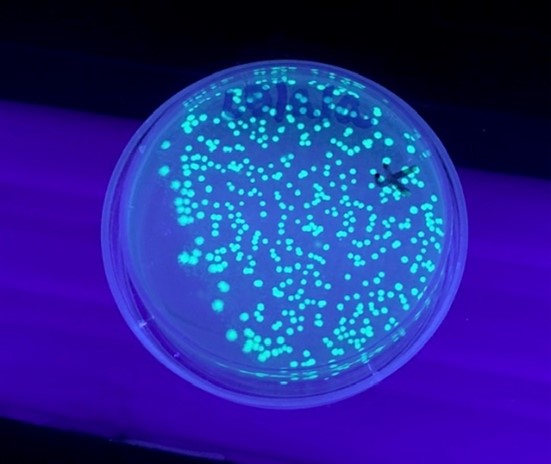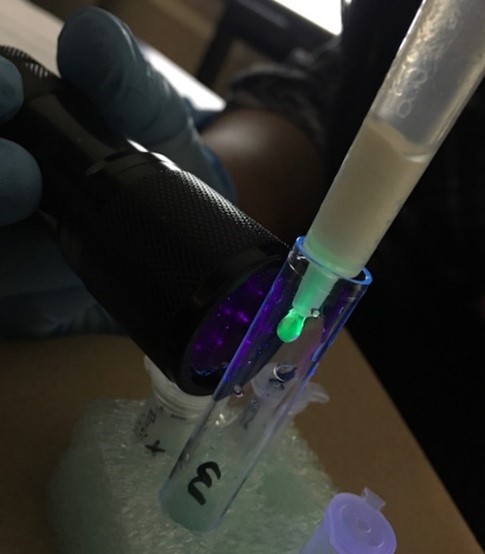Emily Perez
Emily Perez is an MGI doctoral student working in Sean Crosson's lab. Here are her
answers to the Micro Biography questions:
How and when did you become interested in the field(s) of microbiology, genetics,
and/or immunology?

My interest in biology in general started with a comment made by a family member when I was maybe ten. They noticed how much I enjoyed being around animals, so they suggested a career as a veterinarian. I knew I was generally interested in science and figuring out the world around me, so I thought, why not? Fortunately, my high school had a 4-year biomedical program, so I enrolled. Halfway through this program, I realized two things. One, I found human biology way more fun than animal biology, and two, any discussions about disease held my attention. Therefore, I changed my path from a veterinarian to a physician. My love of microbiology developed at the same time. I remember the exact experiment that sparked this wonder for microbiology. In one of my classes, we were tasked with purifying green fluorescent protein from Escherichia coli. For the first time, I saw how small organisms could make such a profound and glowing (literally) change in the world. It was a beautiful experiment that I still have pictures of. The process of the experiment and learning how a bacterium can produce something like this was fascinating to me. From that day forward, I knew I wanted to work with microbes, and, at the time, I thought my role would come in the form of a physician.
Were there any particular people or events who were influential in your journey?
I’m thankful to have a supporting family that never pressured me into a specific path. Even when I changed my mind about medical school, I was met with zero judgment. My older sister, who is getting her PhD in chemistry at the moment, was a huge source of encouragement, motivation, and inspiration. No one in our immediate family are scientists or even has a college education, so I'll always be grateful to my sister for paving a way for me.
The moment that triggered my transition from pre-med to graduate school was when I attended a science talk during my junior year of undergrad at Indiana University. The speaker, Dr. Joyce Patrick from Truman State University, began by talking about her journey to becoming a professor. It turned out she also transitioned from pre-med to graduate school. Her reasoning being that she “cared more about the microbe than the patient”. This statement really stuck with me because it finally gave a description for what I was feeling. Being a doctor means prioritizing patients and being primarily concerned about their health. But what I wanted to do was study the microbes that caused the disease. Treating patients ultimately wasn’t my passion, so I switch
ed to grad school to be able to study microbes.

How did you come to be a part of this department?
I applied to grad school at MSU because I liked the location — it wasn’t too far from home — and I liked the types of research happening. It wasn't until I visited East Lansing and saw how happy and kind everyone was that I solidified my decision. This was the place I wanted to continue my journey. Visiting MSU made me realize how much I value an environment where there is genuine camaraderie and where I feel safe to be a young scientist. Ultimately, I joined the department because I felt I would be happy here.
What is your main research area right now and why is it important?
If, for example, there is a wall in front of you, how do you know where it is and what to do? You use your eyes to see (sense) where the wall is, and then you may respond by moving out of the way. This sense and response system is vital for most, if not all, life. We must be able to sense how our environment is changing around us, and bacteria work in the same way. Pathogens can effectively use their sense and response pathways (also called stress responses) to sense the host environment and evade anything that might cause death. So, to combat these bugs, we can figure out their stress response pathways and block a part of the pathway, also blocking the pathogen from causing harm. The bacteria I work with is a sheep pathogen called Brucella ovis. This bug causes sheep infertility and is a source of burden in many countries. I work with a few proteins that I hypothesize have roles in the general stress response and a more specific detergent stress response. I’m elucidating where these proteins work in the stress response pathways and how they might interact with other proteins. The proteins I work with are part of a family of proteins (called HWE/HRxxN kinases) that are found all over the alphaproteobacteria class. Therefore, my research will not only clarify how Brucella species could be “seeing” and responding to the world around them but could also be informative about how the alphaproteobacteria use this family of proteins for stress responses. This research could ultimately be applied for therapeutics for diseases caused by Brucella.

How do you see your research evolving?
My research will likely take me down the path of bacterial envelope proteins/components since I mostly work with detergents. I may get into structural protein biology with the proteins I work with. However, overall, these stress systems can be complex and intertwining. I don’t think there will be just one answer for why some of my bacterial strains are more resistant to certain stressors over other stressors. Therefore, I expect my research to go off in many different directions.
What types of activities are you involved in outside of research?
I’m mostly a homebody so I spend most of my time at home watching Twitch and YouTube, playing video games, playing piano, or doing arts and crafts. I read and watch a lot of fiction content, which I think is a nice change of pace from what I do at work.
Is there anything else you’d like to share?
To any young scientists reading, please take your time with deciding your future! You have so much more time than you think. I know it feels like there's pressure to get things done at a certain time, but milestones don't have deadlines (deadlines sort of don’t exist in general). You don’t need to be fast. Take that gap year or five. Get a job before you decide to go back to school. Try a different career path. If these are what would make you the happiest, then I say do it!
What is next for you?
Right now, I want to survive grad school. At the time of writing this, I’m waist-deep in the waters of preliminary exam writing (help). After grad school, I hope to jump into an industry job, but I’m overall pretty open to other paths. One thing about me is that I like to go with the flow and not worry too much about how life will look in 5 years. If I’m at the industry job I wanted, then great! If not, then it’s no big deal, I'll get there one day.
What do you see as your current career trajectory?
I hope to go into the food/drinks or water industries for microbiology. I think the research in these industries is not only helpful to the world but also super interesting. I hope to have a career where I can embrace both my passions for mentoring and bench work.